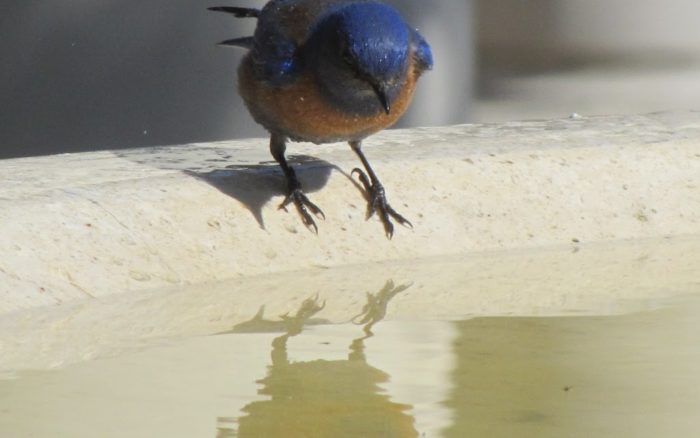| Bluebird before taking the plunge. |
Afterthoughts: Conversation with David Abram, Part Three: Reflections on Beauty and Grief
A third afterthought on the Conversation with David Abram (C. G. Jung Institute, see below.)
Sometimes I wonder if my early years with a diabetic mother about whose survival I worried constantly, have been preparation for this time on earth. Do souls have such agendas? For my generation, it’s been first one thing and then another, being plagued by angst for the survival of life as we know it from the beginning. We were the post nuclear bomb generation, the one taught to “duck and cover” in case of a nuclear attack. Even then, at age 9 or 10, we knew this was ridiculous! One only had to hear about the destruction, the eons of years needed for radioactive decay, the impact of radiation on all life, to know that in the event of a nuclear attack, there would be no ducking.
Into my sons early years, stopping nuclear proliferation was a passion for me. And then, remarkably, the urgency subsided as treaties were signed and the Cold War ended. Nations could no longer afford the nuclear arms race.
Then one Monday evening my husband, two toddler sons, and I were driving to San Francisco when we heard on the radio that a radiation cloud from the Chernobyl nuclear power plant accident would be passing over us. Again, there was no ducking! ― as the most recent nuclear power plant disaster in Japan is again demonstrating!
These last years my attachment to the earth is once again challenged. The earth is warming due in large part to pollution. Western nations are using inordinate amounts of resources, creating toxins and pollution that are altering life on our planet, making it less diverse, more sterile. Developing nations aspire to use as much as western nations, which is impossible, given the resources available on our planet. Weather patterns are more erratic and severe. Suddenly a dry winter becomes a stimulus for alarm: is this climate change? What if this is the new norm? What about these coastal oaks and madrone dying from sudden oak death? (The Department of Agriculture office told us our native madrone may no longer exist on these mountains in a few years time.) Have we caused this as well?
For a while after September 11, 2001, I could not look at the beauty of the meadow around our home. I felt a shield between myself and the night sky resplendent with stars, buffering the melodic birdsongs of spring and the sweetness of fresh-turned, damp earth in the garden. To be open to the beauty of the oak savannah west of our home hurt!
What is this? I remember how in my own analytic work I spent years opening my heart to my mother. (Despite her many complications and emergencies, she lived to be 80. I wish I had known! ) This time around, though, I’ve had more psychological muscle gained from my analysis. Besides, the beauty of the earth is persistent! Somehow I have been able to at once feel awe in the presence of the ancient valley oaks that often seem to shine with their own light and, at the same time, take in how even my own actions may be hurting them.
David Abram writes:
There are those… not frightened of grief; dropping deep into the sorrow, they find therein a necessary elixir to the numbness. When they encounter one another, when they press their foreheads against the bark of a centuries-old tree, or their palms into the hand of yet another child who has tasted prematurely of wrenching loss, their eyes well with tears that fall easily to the ground. The soil needs this water. Grief is but a gate, and our tears a kind of key opening a place of wonder that’s been locked away. Suddenly we notice the sustaining resonance between the drumming heart within our chest and the pulse rising from under the ground. (Becoming Animal: An Earthly Cosmology, p. 309)
There is a homeopathic remedy for chronic grief, natrum muriaticum, or table salt (grief, bitterness). Jungian analyst Edmond Whitmont has described it as a remedy of consciousness, the consciousness of the separation from the original wholeness, as in salt from the motherly sea. In the pathological state it treats the bitterness of feeling isolated and depressed. Bringing balance, it offers consciousness, and paradoxically communion: the individuating task of feeling oneself discrete in awareness of how we are connected to all. Or, perhaps, as David puts it, the remedy affords that ability to once again feel “that sustaining resonance between the drumming heart within our chest and the pulse rising from under the ground.”
The Environmental Crisis and the Living Quest of the Embodied Psyche, David Abram in Conversation with Patricia Damery. February 10, 2012, at the David Brower Center in Berkeley, CA. Presented by the C. G. Jung Institute of San Francisco, CA.
